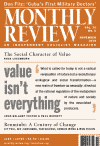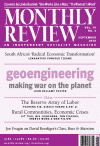Global

The twenty-first century has resulted in a vast upsurge of ecological Marxism and ecosocialism more generally, building on the environmental critique of capitalism embedded in classical historical materialism. At the same time, it has also engendered opposing tendencies and approaches concerning how we understand relentless ecological destruction under capitalism. This issue is dedicated to exploring the theoretical advances, schools of thought, and debates on the left in regard to our world’s ecological crisis, which threatens the survival of humanity and is inescapable within the present capitalist system of production. | more…

The rapid advances in Marxian ecology in the last two decades have given rise to extensive debates within the left, reflecting competing conceptions of theory and practice in an age of planetary ecological and social crisis. One key area of dispute is the attempt by a growing number of radical environmental thinkers to deconstruct the labor theory of value in order to bring everything in existence within a single commodity logic. For many in Green circles, Karl Marx and a long tradition of Marxian theorists are to be faulted for not directly incorporating the expenditure of physical work/energy by extra-human nature into the theory of value. In response, this article argues that any form of analysis that seeks to eliminate the deep-seated dialectical contradictions between the natural form and the value form, as well as between the capitalist economy and the larger socioecological metabolism, fails to comprehend the complex, interdependent dialectics of nature and humanity. | more…

In this excerpt from The Accumulation of Capital, Rosa Luxemburg explains how classical political economy lacks a clear conception of the commodity—both in the terms of the distinctions between use value and exchange value, as well as between concrete and abstract labor. This metaphysical, essentialist framework leads to a complete failure to understand the social character of labor’s capacity to create value. | more…

There is by now no question among informed people that the Earth is undergoing severe climate change—soon to become catastrophic, if humans don’t take drastic measures to stop it. Heroically into the fray steps the biofuel industry, announcing to millions of anxious consumers that this eco-crisis can be averted if only they turn away from fossil fuels, to the saving power of synthetic bioproducts. But, although eliminating fossil fuels is essential, the manufacture of biofuels has far more to do with sating profit-hungry corporations than with saving the Earth. Combining meticulous scientific narrative with devastating economic analysis, The Biofuels Deception argues that the seemingly innovative, hopeful campaign for “green energy” is actually driven by bio-technology industries and global grain-trading corporations. | more…

One of the horrors of the capitalist system is that slave labor, which was central to the formation and growth of capitalism itself, is still fully able to coexist alongside wage labor. But, as Karl Marx pointed out, it is the fact of being paid for one’s work that validates capitalism as a viable socio-economic structure. Beneath this veil of “free commerce”—where workers are paid only for a portion of their workday, and buyers and sellers in the marketplace face each other as “equals”—lies a foundation of immense inequality. Yet workers have always rebelled. They’ve organized unions, struck, picketed, boycotted, formed political organizations and parties—sometimes they have actually won and improved their lives. In his timely and innovative book, Michael D. Yates asks if the working class can, indeed, change the world. | more…

In the last piece he wrote before his passing, Samir Amin revisits, for our age, the most important revolutionary document of all time, the Communist Manifesto. In a fitting conclusion to the work of a great revolutionary intellectual, Amin seeks nothing less than to explain the changing world trajectory from 1848 to 2018. Against the persistent vision of the globalized development of capitalism, he puts forward a vision for the transformation of the world through revolutionary processes—breaking with the submission to the deadly vicissitudes of the decadence of civilization.

In this excerpt from his forthcoming title, Can the Working Class Change the World?, Yates details the historical development of the working class—its potential for (and barriers to) unity, and how it is still the only force in society that can bring about its fundamental, radical transformation. | more…

Founded in the late 1960s and recently revived, the radical organization Science for the People did—and does—far more than just publish a magazine. Chapters are forming around the country, including physicists, engineers, and biologists, as well as representatives of other scientific groupings and social movements. We at MR welcome the return of this great publication and movement of the U.S. left. | more…

Geoengineering and Capitalism's Creative Destruction of the Earth
The dangers posed by climate change have inspired a desperate search for technological fixes in the form of geoengineering—massive human interventions to manipulate the entire climate or planet. But as long as the dominant strategy for addressing global warming remains subordinated to the ends of capital accumulation, any attempt to implement such schemes will prove fatal to humanity. | more…

Linda Backiel is a criminal defense attorney practicing in San Juan, Puerto Rico. | more…

A Letter to István Mészáros from Paul M. Sweezy, October 16, 1992
In October 1992, MR founding editor Paul M. Sweezy wrote the following brief letter, published here for the first time, to István Mészáros in response to an interview with Chris Arthur and Joseph McCarney that had just been published in Radical Philosophy. Sweezy saluted the critical significance of Mészáros’s argument on “the monstrous power of capital,” and the failure of many Marxists to perceive this problem in its full dimensions. He also affirmed the imperative of incorporating the ecological economics of Nicholas Georgescu-Roegen.

Capitalism and the Metabolic Rift
Marx’s notion of “the robbery of the soil” is intrinsically connected to the rift in the metabolism between human beings and the earth. To get at the complexities of his metabolic rift theory, it is useful to look separately at the issues of the robbery and the rift, seen as separate moments in a single development. | more…











